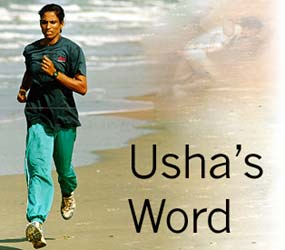Home > Sports > Athens 2004 > Columns > P T Usha

Indian athletes should train in China
August 31, 2004
I had a disturbed sleep on Saturday night. A couple of hours ago I watched four tearful Indian girls leaving the track after finishing lowly seventh in the 4x400m relay final. The quartet could not even clock what they did in the heats, which was a new national record. What exactly went wrong, I was wondering.
 | Previous column |  | |
|
True, the absence of Manjit Kaur cost India dear. She was the most impressive among the four Indian girls in the heats and could have stretched India to a better rank in the final. But, then, why did she get indisposed after the heats? While I have all the respect for Manjit as a fine athlete, I cannot accept the fact of her getting unfit after just one race. The authorities should have made a proper fitness test of all the athletes before bringing them here.
Manjit's absence, however, was not the only factor behind the relay team's poor show in the final. The Indian athletes showed a common trend in Athens. Most of them did well in their initial attempts only to fade away when it mattered most.
K M Binu performed creditably in the heats only to disappoint in the final. It was the case with Anju Bobby George in the long jump, too. She was terrific in the first jump, but just when we were expecting a better show from her, she faltered. With the timing the relay team clocked in the heats, they should have ended up a creditable fourth. All they did was finish a poor seventh.
Does that mean our athletes were content after reaching the finals and lost the fire within them to do better? Or was it wrong strategy? I have a feeling that it was the second reason that messed up the whole thing. Our coaching team could not chalk out proper planning. One has to improve step by step in order to do well in the Olympics. Perhaps our team management forgot this basic fact and allowed the athletes to peak at the wrong time.
There is no point pondering over what has already happened. It is time to think about the future. In my humble opinion, Indian sports management should now start making plans for the 2012 Olympics and not the one to be held in Beijing four years later.
Beijing, I think, could be a completely different experience. The Olympics has been never been held so near our country. We should take this opportunity to learn both about the development of sports as well as organising it. I fully agree with IOC president Jacques Rogge that China should be the role model for every sporting nation in the world. What they have achieved in the last few years, especially in this Olympics, is simply amazing.
A few of my friends in the US athletic squad were telling me the other day that the officials, coaches and athletes of the US team held a meeting a few days ago here in Athens. They were too worried about China's aggression even in the track and field events, which the Americans dominated for a long time. They will now go back and start afresh to regain their supremacy in Beijing. But, let me tell you, that's not going to be an easy task. China will do even better on their home ground. We, too, should send our sportsmen to China for training. The Chinese training method, I am quite convinced now, is the best in the world at the moment.
Coming back to India's showings in Athens, I feel that we put some of our athletes under too much pressure. They could not take it and faltered at the crucial moments. We were extremely hopeful about shooter Anjali Bhagwat, the hockey team and Anju Bobby George. They could not deliver the goods. I think we should not blame them. To perform well at the world stage, that too against the best in the world, is a difficult proposition. We should not stop encouraging our athletes.
But when I talk about the 2012 Olympics, I think about fresh talent, not the ones we have now. And for that, we need huge planning and scientific minds. Otherwise, we will remain where we are. Are the authorities listening?